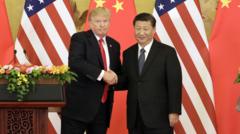Amid an unprecedented uptick in burger consumption in the United States, the intersection of tariffs and trade wars is projected to alter prices and supply dynamics dramatically.
### The Trade War's Effect on American Burgers: Analyzing Increased Prices and Global Shifts

### The Trade War's Effect on American Burgers: Analyzing Increased Prices and Global Shifts
As tariffs rise, American consumers face potential price hikes on burgers, while Brazil and China position themselves to benefit commercially.
American love for hamburgers spans backyard barbecues to fast-food outlets, where burgers typically comprise a mixture of domestically sourced beef and growing imports, predominantly from Brazil. However, recent trade tensions instigated by the Trump administration are reshaping this landscape.
The imposition of tariffs has made Brazilian beef imports more expensive, directly impacting the final price of hamburger patties for American consumers. Despite this, Brazil stands to gain from the situation. With escalating tariffs between the U.S. and China, the latter is now diversifying its beef import sources, increasing its dependency on Brazilian beef.
Recent trade data highlight that U.S. meatpackers, anticipating higher costs, have begun stockpiling Brazilian beef. This shift could imply two outcomes: American consumers may endure rising prices at the grocery store, while Brazil’s beef export volumes to China have surged since the trade fallout.
This unfolding scenario not only spotlights the intricacies of global trade but also indicates a potential realignment of beef supply chains, which could see bulk protectionist measures serving to both harm U.S. consumers and offer unexpected benefits to other countries involved in the global food economy.




















